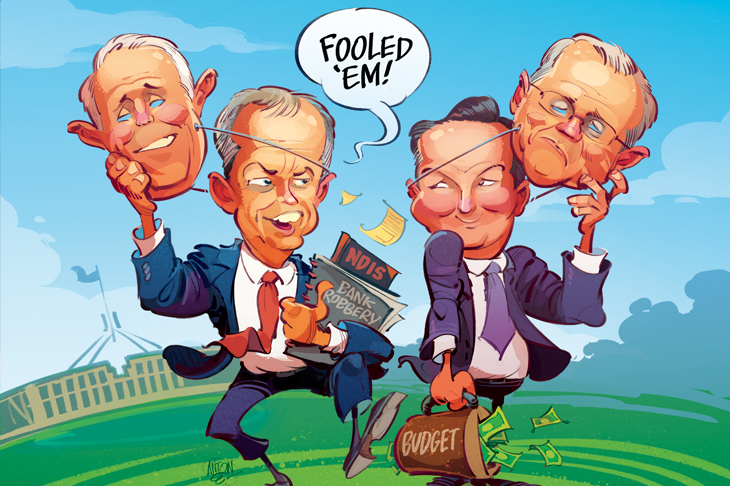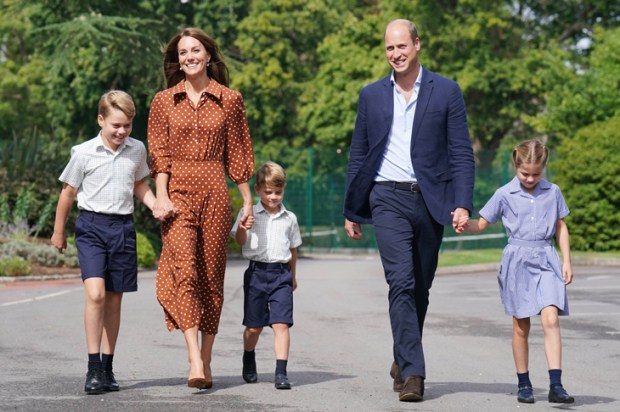The budget week just gone has marked the moment when both sides of politics officially gave up on budget repair and economic reform. Barring a change of leadership on the Coalition side or a change of heart from Labor, Australia now faces budget deficits as far as the eye can see and is set on an indefinite period of ever higher spending chased by ever higher taxes.
Going down the European path is likely to give us the European result of economic stagnation, knee-jerk populism and national decline. The budget’s claimed surplus four years hence is achieved almost entirely by transfers from the Future Fund and is predicated on rosy assumptions about uninterrupted and higher economic growth leading to implausible increases in company tax, capital gains tax and income tax receipts.
For all Treasurer Scott Morrison’s talk of ‘living within our means’, the budget is a spending spree financed by a tax grab. Of course, the banks are unpopular but since when has unpopularity justified a tax grab? Of course, savings legislation is hard to pass but since when has an elected government had its policy dictated by the ‘unrepresentative swill’ in the senate? Of course, Labor has run scare campaigns about alleged cuts to health and education – that’s just what Labor does – and, in any spendathon, the Coalition will always lose.
For decades, the Coalition has been the party of economic responsibility and Labor has been the party of increased social spending. At a stroke, in this budget, the Coalition has lost its strength without grabbing Labor’s.
Labor really believes in extra spending on schools and hospitals while Malcolm Turnbull has been forced into it, in a desperate bid to avoid losing 30 Newspolls. Offered a choice between a party that’s sincere and one that’s not, voters will always chose the fair dinkum over the fake. The scale of the Coalition’s U-turn is hard to exaggerate. For years, the Coalition has said that economic growth requires lower spending, lower taxes and smaller government. This budget gives us more spending, more taxes and more government, including a virtual inquisition into the banking sector.
This is from the party that denounced Labor’s bank deposit tax and demonised Labor’s carbon and mining taxes. It’s more than a political surrender; it’s an intellectual surrender of historic proportions that will permanently damage our polity if it doesn’t end up terminating the Turnbull prime ministership. There are always grounds for some new spending. New drugs have to be accommodated. Better teachers have to be paid for. But what’s mostly needed is better spending, not more. After saying for years that better schools needed better teachers, higher standards, more parental involvement and more principal autonomy, the conversion to ‘Gonski 2.0’ is simply incredible.
But as spendthrift as this government has become, the opposition is even worse. It doesn’t matter how much the government proposes to spend on schools and hospitals; for Labor, it’s never enough. Labor continues to insist that the government has ripped $22 billion out of schools and vows that it will spend the extra; and continues to claim that the National Disability Insurance Scheme was ‘fully funded’. Labor would keep the bank tax (of course), keep the temporary deficit levy on high income earners and scrap the Medicare levy increase for low income earners to give an overall budget outcome that’s about $10 billion further in the red.
There will be lots of argy-bargy in coming weeks about how Labor’s figures don’t add up. But neither do the government’s. Both sides will spend more and tax more. Neither side is ever going to bring the budget back to surplus. Either way, debt will grow inexorably towards a trillion dollars. The Coalition will be marginally less economically irresponsible but will face Labor’s relentless accusations that it wants to tax low income workers more and millionaires less. If it couldn’t resist the last scare campaign, no one can be confident that it won’t capitulate to this one too.
The alternative to ‘if you can’t beat ‘em, join ‘em’ is ‘if you don’t like it, fight it’. It’s noteworthy that the budget spending is for the schools lobby, the health lobby and the states. It won’t actually put any extra money into people’s pockets – and, via the bank tax, will almost certainly take some out.
Eventually, people will notice some of the infrastructure spending but, in the way of these things, that’s years away. The giveaways are for the pressure groups that have led the scare campaigns, not for long-suffering householders who feel they can never get ahead. That’s why this budget is such poor politics as well as such dubious economics.
If it wanted to, the Coalition could have a fight with Labor while doing something for families feeling the pinch. If it wanted to, the Coalition could change the Senate rather than surrender its principles. But that would mean freezing the renewable energy target and reforming the Senate to make it a house of review rather than rejection – and they’re both Tony Abbott’s ideas.
Abbott remains a pariah, if not to Liberal Party members at least to the inner sanctum of the Turnbull government. Day-to-day politics is more dominated than ever by polls that can fluctuate. In the end, though, it’s always the fundamentals that count.
In my judgment, the Liberal Party is heading for a catastrophic defeat. There have now been two seismic events on the road to disaster: first, the Turnbull coup when the Liberals adopted Labor’s practice; and second the 2017 budget when the Liberals adopted Labor’s policy. The longer the Turnbull government lasts, the better the Abbott government looks – especially in terms of fiscal repair and economic reform.
Got something to add? Join the discussion and comment below.
Get 10 issues for just $10
Subscribe to The Spectator Australia today for the next 10 magazine issues, plus full online access, for just $10.
You might disagree with half of it, but you’ll enjoy reading all of it. Try your first month for free, then just $2 a week for the remainder of your first year.














Comments
Don't miss out
Join the conversation with other Spectator Australia readers. Subscribe to leave a comment.
SUBSCRIBEAlready a subscriber? Log in